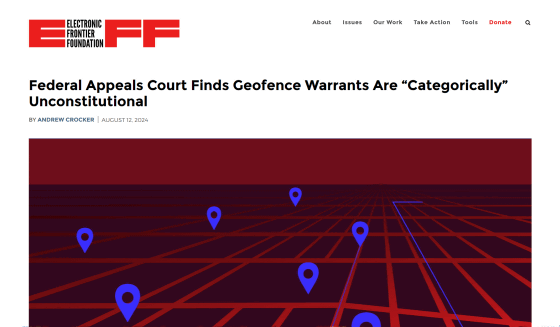Court rules that 'geofence warrants' that indiscriminately request data from smartphones that pass near crime scenes are unconstitutional

The Fifth Circuit Court of Appeals has ruled that geofencing warrants, which allow law enforcement agencies to request data from Google and other companies about devices that have passed through a specific area, violate
Federal Appeals Court Finds Geofence Warrants Are “Categorically” Unconstitutional | Electronic Frontier Foundation
https://www.eff.org/deeplinks/2024/08/federal-appeals-court-finds-geofence-warrants-are-categorically-unconstitutional

US appeals court rules geofence warrants are unconstitutional | TechCrunch
https://techcrunch.com/2024/08/13/us-appeals-court-rules-geofence-warrants-are-unconstitutional/
5th Circuit rules geofence warrants illegal in win for phone users' privacy | Ars Technica
https://arstechnica.com/tech-policy/2024/08/5th-circuit-rules-geofence-warrants-illegal-in-win-for-phone-users-privacy/
A geofence is an area surrounded by a virtual boundary, and by using the location information of a device such as a smartphone, it is possible to identify devices that have entered or exited a specific geofence. A warrant issued by a law enforcement agency conducting a criminal investigation to request data on devices that have entered or exited a geofence around a crime scene is called a 'geofence warrant,' and is issued mainly to Google, which collects data on Android devices.
However, some have raised concerns that geofencing warrants, which collect large amounts of data indiscriminately without identifying the perpetrator, may violate the Fourth Amendment to the Constitution, which states that 'No warrant shall issue unless probable cause is shown under oath or affirmation in lieu of oath, and the place to be searched, and the persons to be detained, or things to be seized, are specifically described.'
In the case of a geofence warrant, the criminal is not identified at the time the warrant is issued, but 'data from devices that pass through the geofence around the crime scene' is collected indiscriminately. As a result, not only the criminal but also the innocent people's data is collected in large quantities, which is criticized as being unreasonable search prohibited by the Fourth Amendment of the Constitution.

On August 9, 2024, the U.S. Court of Appeals for the Fifth Circuit, which covers Louisiana, Mississippi, and Texas, ruled that geofencing warrants are unconstitutional in a trial involving a robbery at a Mississippi post office in February 2018.
In this case, the perpetrator could not be identified despite several months of investigation, but it was clear from the footage captured by a nearby camera that the perpetrator was using a smartphone. Law enforcement agencies then set up a geofence covering approximately 98,000 square meters around the post office where the crime occurred, and requested data from devices that passed through the geofence for one hour before and after the crime using a geofence warrant. As a result, the robbery perpetrator was identified.
'These searches are being conducted without the knowledge of whom law enforcement authorities are looking for, or even whether the searches will produce any results. Indeed, the essential problem with these warrants is that they do not contain the users (perpetrators) to be identified, but only the time and geographic area within which the perpetrators may be found after the search. This is constitutionally insufficient,' the court said in its ruling.
Although the court ruled that the geofencing warrant itself was unconstitutional, it acknowledged that geofencing technology was novel in 2018 and that law enforcement had acted in good faith in investigating the case. Therefore, it ruled that the evidence should be admitted at trial in this case.

The nonprofit Electronic Frontier Foundation (EFF) welcomed the ruling, saying, 'We are pleased that the Court of Appeals recognized the fundamental invasion of privacy that geofencing warrants pose and upheld the Constitution's ban on broad searches.'
In addition, Google announced an update at the end of 2023 that will store location history on users' devices. This has reportedly effectively rendered law enforcement geofencing warrants ineffective.
Google Maps update makes it impossible to provide data on 'users near crime scenes' to law enforcement agencies - GIGAZINE

Related Posts:
in Web Service, Smartphone, Security, Posted by log1h_ik






